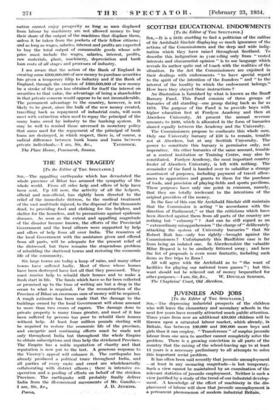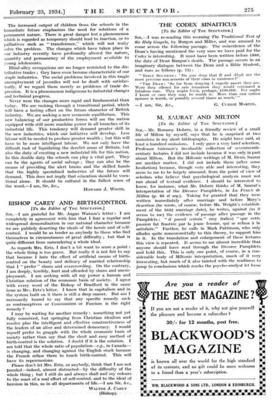JUVENILES AND JOBS
[To the Editor of TILE SPECTATOR.] .
SIR,—The depressing industrial prospects of the children who will leave the elementary and secondary schools in the next few years have recently attracted much public attention. Three years from now an additional 450,000 children will be thrown upon a saturated labour market, which already, in Britain, has between 100,000 and 200,000 more boys and girls than it can employ. " Transference " of surplus juvenile labour from one area to another cannot completely solve the problem. There is a growing conviction in all parts of the country that the raising of the school-leaving age to at least 15 years is a necessary preliminary to all attempts to solve this important social problem.
It has often been said recently that juvenile unemployment —at least in any menacing magnitude—is but temporary. Such a view cannot be maintained by an examination of the relevant statistics of juvenile employment. Neither is such a view justified by a study of the trend of our industrial develop- ment. A knowledge of the effect of machinery in the dis- placement of labour will show that juvenile unemployment is a permanent phenomenon of modern industrial Britain.
The increased output of children from the schools in the immediate future emphasizes the need for solutions of a permanent nature. There is great danger lest a phenomenon which is regarded as temporary should lead to inaction, or to palliatives such as " transference," which will not really solve the problem. The changes which have taken place in our industry recently have profoundly altered the nature, quantity and permanency of the employment available to young adolescents.
Blind-alley occupations are no longer restricted to the dis- tributive trades ; they have even become characteristic of our staple industries. The social problems involved in this tragic unemployment of juveniles will not be dealt with satisfac- torily, if we regard them merely as problems of trade de- pression. It is a phenomenon indigenous to industrial changes and technical progress.
Never were the changes more rapid and fundamental than today. We are rushing through a transitional period, which will have a lasting effect on the future -character of British industry. We are seeking a new economic equilibrium. This new balancing of our productive forces will see the nation equipped with still more machine power in all branches of its industrial life. This tendency will demand greater skill in the new industries, which our initiative will develop. Less labour will be needed to produce greater wealth ; but this will have to be more intelligent labour. We not only have the difficult task of liquidating the derelict areas of Britain, but also the duty of creating a new industrial life for this nation. In this double duty the schools can play a vital part. They can be the agents of social salvage ; they can also be the means of providing the alert brains and the skilled hands that the highly specialized industries of the future will demand. This does not imply that education should be voca- tional alone. It should be cultural in the fullest sense of the word.—I am, Sir, &c., HOWARD J. WrirrE.

















































 Previous page
Previous page